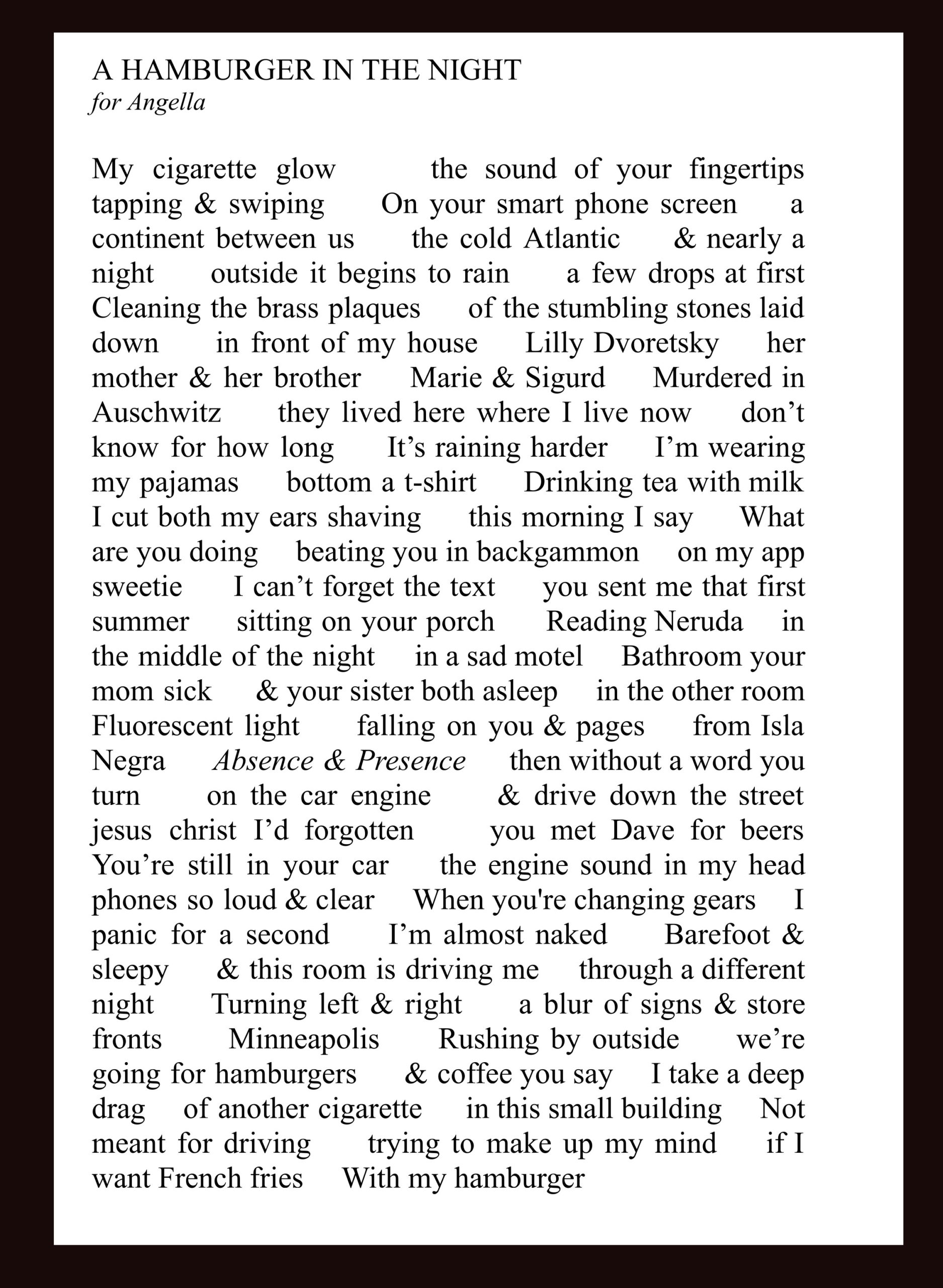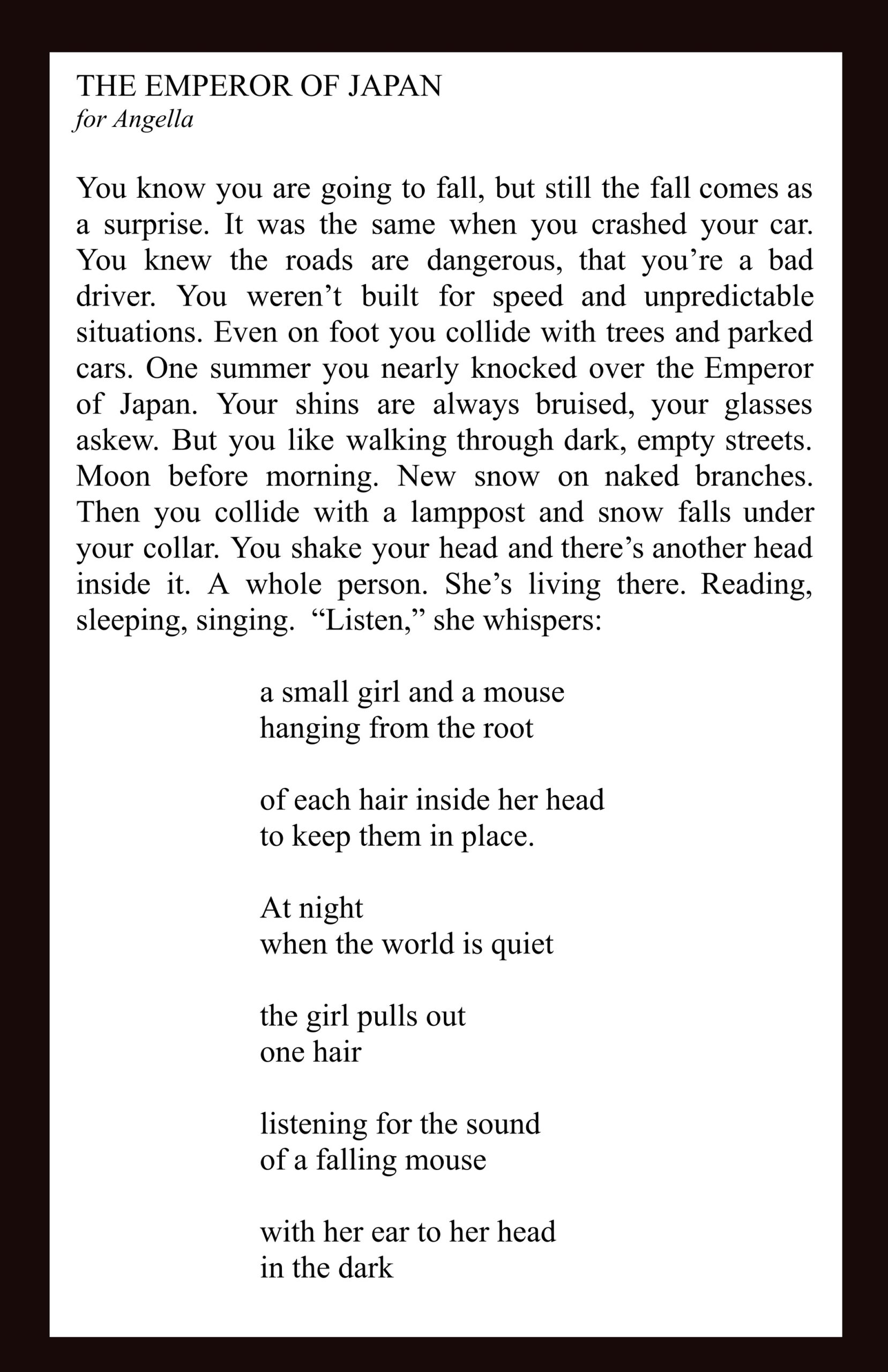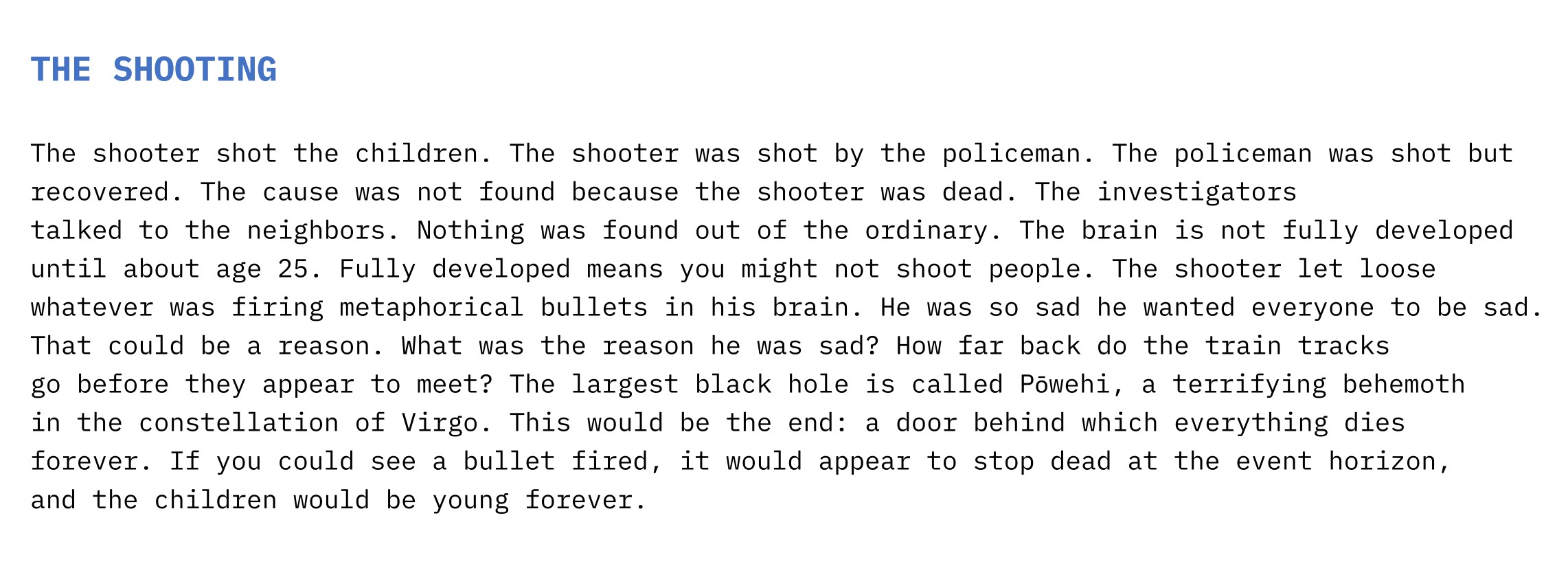

Dag T. Straumsvåg

Dag T. Straumsvåg

Fleda Brown

Fleda Brown
DURING WHICH I WANT TO EXILE MYSELF FROM THE EVENING
I am alone at the reading, alone in the evening, though that’s not to say I had arrived here alone, my friends are new and in the front seats, I once loved so many people so fiercely and they took my rough edges, made them sinews. I read poems about phantom pains, I can’t believe the grief of the thing is the grief itself, there are times when I think I’m still in love with you but I’m trying not to touch the thin edge of memory. I go home and decide whether to tell the truth or whether to make work. Some days it’s roses and red beams, riding the long edge of dusk alone on a stolen bike. Other times, it’s relapse, and the boys at the end of that road waiting to toss my body into the creek. They’ll write stories about me, but the misunderstood kind. Multiple times I think to myself, don’t go there. But it’s too late, I already went, my colleague tells stories about me at the podium, she says stars and scars interchangeably and I wonder what she means, she says my work is about healing and I resist the urge to raise my hand and ask her what she’s talking about, there is no healing here, I dig a tiny circle into my arm with my nail and hope the woman sitting next to me can’t see. I wish I could say I imagined everyone as dreams or trees or a field of cows in buttercups. I wished everyone was my father and my cousins who hate me, I wished for aunts and uncles and love, instead there are strangers, there are friends I want to love but fear, raw, always steps in the way. I send them off with facts about me I wish no one knew, but it’s in the piece and therefore it must be true. I wish I wasn’t afraid, I wish I had eaten more of the sharp cheddar cheese. Too many people are hugging me and telling me to save my life. What they don’t understand is, long after the drama and the trauma have ended, and you are all alone in the evening, no one can stop you but yourself, you’re on a bath mat again as green as an emerald or a lake, mother buys the soft ones, you’re going to have to walk your own body back again and again, every time you crawl too close to the edge of losing yourself, I’m sorry, I wish this were different but I have a fever again.
Sam Moe
TELL ME YOU WANT TO KNOW AND WE’LL GO FROM THERE
Hazy days. Everywhere green, muggy, vegetable fields encircled by pines, reminds me of the times we walked near fields of wheat, monarch butterflies, still loved each other, didn’t mind highway overpasses, strangers on bicycles, a stray grey cat wrapping its body around legs, the times I went to parties and couldn’t enter unless I took all my clothes off. The house with the sharks, the chef with sun tattoos on both his knees, she came with me back then, we couldn’t be together, we belonged to the men, so many of us clustered around each other at the edge of the jellybean pool. Bitter, couldn’t swim in the expensive water, outcast, eating too many empanadas by the stove, never learned to sew but quick with a needle and skin, railroad tracks, cat claws, praying in the bathroom for breath to return to my lungs. Wonder what you’d do if you knew. Isn’t this always how it goes? Warm bar, beer is average, I want them to love me but realize loving means knowing, and knowing is distrust, times I sold tech and gold, have so many rivals I can’t go home without hiding, could only pay waitresses in pennies and nickels until work picked up, do you want to know about the times I ran out of clothes, stole from cheerleaders, pocketed statues of blue cows and ice-clear birds, roses blown from glass, a necklace passed down from many grandmothers, learned to read stamps on silver, first I’ll need you to adore me, then we can talk about the blood.
Sam Moe
DONATIONS
No one ever refuses his request.
“Of course!” each stranger says immediately, as though terrified he’ll change his mind. “Yes, please take my shame!”
And then they reach inside to scoop it out like quivering gobs of rancid chicken fat, unseen yet palpable, and plop it into his wheeled 45-pound weatherproof airtight pet food storage container, the handiest transport system he could come up with.
Is he a masochist or martyr, planning to haul all that shame into his kitchen, fry it up and gobble it down? Is he an installation artist preparing to wrap the city in a heavy blanket of shame as an ideological statement? No one knows, and they’re too busy enjoying their freshly unclogged state to ask.
But it’s not long before they need to track him down. He isn’t hard to find–he’s hermetically sealed himself within the invisible igloo-shaped structure made entirely of shame he’s slathered together, packed down, and smoothed by hand from the inside. They can see him lounging serenely in his recliner.
“Give us back our shame!” they cry. “We don’t know who we are anymore because we can’t feel who we used to be!”
Sensing the presence of that great crowd all around him, he looks up–these donors must have gathered to convey their thanks, he thinks, or maybe they’ve already accumulated even more shame to offer, but he doesn’t need it now that he’s created his 100 percent insulated home. Previously, he worked with a range of structures and materials–cellulose, fiberglass, mineral wool, polyurethane, spray foam, caulk, epoxy, and radiant barriers—until he finally realized that all he needed was sufficient quantities of shame, not dredged from his own experiences, but from the psyches of others with whom he has no personal connection, so for him, the substance is neutral, inert, without any feeling-tone whatsoever.
Grateful, he gives his visitors an awkward imitation of the Queen-wave he saw once on TV and has always wanted the opportunity to perform.
Claire Bateman
THE REMEDY FOR HAUNTING
You’ve called in your friends who entered without a word, tiptoeing barefoot one by one through the back door and taking their positions; it requires all your collective subterfuge and speed to successfully rush the ghost, surrounding it as it trembles, blanches, lunges at each of you trying to break through the chain of linked hands, but everyone hangs on tightly while together you chant the digits of pi since as everyone knows, the presence of irrational numbers causes spectral shrinking and paralysis.
According to federal mandate, of course, you must stop before the ghost winks out of existence—plan to fall silent around the five hundredth digit when your prisoner has dwindled to the size of a standard ice cube, but don’t expect the state to take responsibility, even in cases of full-blown infestation.
What to do with all your tiny, freshly immobilized ghosts? Though some people drive them out to the country, wedging them into the hollows of trees or the crooks of branches, this is generally considered to be inhumane.
Best practice is to suspend them in miniature bird cages throughout your home like a menagerie of pets you never have to feed. Each ghost will emit a stream of inarticulate murmurs and gurgles, a low, continuous burbling sound like that of an old-fashioned office water cooler, not unpleasant despite its doleful resonance, and more effective than the standard white noise machine.
Claire Bateman
Dag T. Straumsvåg has been employed as a farmhand, sawmill worker, librarian, and sound engineer for a radio station in Trondheim, Norway, where he has lived since 1984. He is the author and translator of eight books of poetry, including A Bumpy Ride to the Slaughterhouse (2006), The Lure-Maker from Posio (2011), both from Red Dragonfly Press, and Nelson (Proper Tales Press, 2017).
Fleda Brown’s tenth collection of poems, Flying Through a Hole in the Storm (2021) won the Hollis Summers Prize from Ohio University Press and is an Indie finalist. Earlier poems can be found in The Woods Are On Fire: New & Selected Poems, chosen by Ted Kooser for his University of Nebraska series, 2017. Her work has appeared three times in The Best American Poetry and has won a Pushcart Prize, the Felix Pollak Prize, the Philip Levine Prize, and the Great Lakes Colleges New Writer’s Award, and has twice been a finalist for the National Poetry Series. Her new memoir is Mortality, with Friends (Wayne State University Press, an MIPA Winner and Midwest Book Award winner in memoir). She is professor emerita at the University of Delaware and was poet laureate of Delaware from 2001-07.
Sam Moe has received residencies from VCCA and Château d’Orquevaux. She is the recipient of a 2023 St. Joe Community Foundation Poetry Fellowship from Longleaf Writers Conference. Her work has appeared or is forthcoming from Peatsmoke Journal, The Indianapolis Review, Sundog Lit, and others. Her first full-length collection, Heart Weeds, was published with Alien Buddha Press (Sept. ’22) and her second full-length collection Grief Birds was published with Bullshit Lit (Apr. ’23). Her third full-length Cicatrizing the Daughters is forthcoming from FlowerSong Press.
Claire Bateman is the author of nine poetry collections, most recently, Wonders of the Invisible World with 42 Miles Press and SCAPE with New Issues Poetry and Prose. Her fiction collection, The Pillow Museum, is forthcoming with FC2 Press in 2025. She has been awarded individual artist fellowships from the NEA, the Tennessee Arts Commission, and the Surdna Foundation as well as the New Millennium Writing Prize (twice) and two Pushcart Prizes. One of her stories was recently nominated by The Ekphrastic Review for Best Small Fictions 2023. She is also a visual artist. She lives in Greenville, SC.
Editor’s Note: As part of our commitment to paying our authors, I’ve turned my hobby of visiting garage sales, flea markets, and antique stores into a way to fund-raise for the magazine. All proceeds will go to paying our authors or to the magazine (ads, and possibly broadsides).